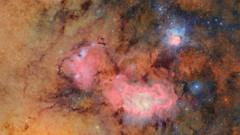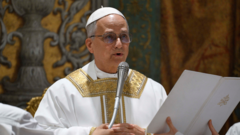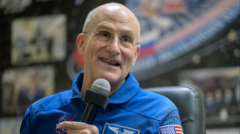Jim Lovell, the astronaut famous for guiding the Apollo 13 mission back to Earth against overwhelming odds, has died at the age of 97. NASA described Lovell as a pivotal figure who transformed a near-catastrophe into a beacon of success when an onboard explosion forced the team to abort their moon landing. Millions watched in suspense as Lovell, along with his crew members, returned safely to Earth—a moment that remains a landmark in space history.
Jim Lovell, Legendary Apollo Astronaut, Passes Away at 97

Jim Lovell, Legendary Apollo Astronaut, Passes Away at 97
Iconic figure who led Apollo 13 to safety dies, leaving an indelible mark on space exploration.
Lovell’s remarkable life began on March 25, 1928. From a young age, he was captivated by aviation but faced significant challenges, including the death of his father and a lack of financial resources for higher education. He joined the U.S. Navy, where he trained as a pilot while acquiring a college education. After significant struggles, including a temporary health issue that initially barred him from NASA, he eventually became one of its distinguished astronauts.
His journey took him to NASA, where he participated in historic missions, including Apollo 8, which first orbited the Moon in 1968. Notably, the mission featured the famous "Earthrise" image, profoundly impacting humanity's perspective on our planet as a delicate oasis in the vastness of space.
Among his achievements, Lovell is perhaps best remembered for the Apollo 13 mission in April 1970. As the crew encountered a life-threatening emergency in deep space, Lovell's calm leadership became essential in guiding them back home. His voice famously transmitted the phrase, "Houston, we've had a problem,” which encapsulated the severity of their situation. The meticulous planning and execution from both the astronauts and ground control resulted in their safe landing in the Pacific Ocean—a mission celebrated not for its intended goal, but for its extraordinary comeback.
Following his retirement from NASA in 1973, Lovell transitioned to a quieter life, though he remained a prominent figure, delivering speeches and authoring books about his experiences, including "Lost Moon: The Perilous Voyage of Apollo 13," which inspired the acclaimed film starring Tom Hanks. Lovell's legacy endures not just in his accomplishments but in his remarkable ability to inspire and unite people through the spirit of exploration and resilience.
As his family reflects on his life, they highlight his unwavering optimism and influence, recalling his ability to inspire those around him to reach for the impossible—proof of his extraordinary character and enduring impact on generations to come.
His journey took him to NASA, where he participated in historic missions, including Apollo 8, which first orbited the Moon in 1968. Notably, the mission featured the famous "Earthrise" image, profoundly impacting humanity's perspective on our planet as a delicate oasis in the vastness of space.
Among his achievements, Lovell is perhaps best remembered for the Apollo 13 mission in April 1970. As the crew encountered a life-threatening emergency in deep space, Lovell's calm leadership became essential in guiding them back home. His voice famously transmitted the phrase, "Houston, we've had a problem,” which encapsulated the severity of their situation. The meticulous planning and execution from both the astronauts and ground control resulted in their safe landing in the Pacific Ocean—a mission celebrated not for its intended goal, but for its extraordinary comeback.
Following his retirement from NASA in 1973, Lovell transitioned to a quieter life, though he remained a prominent figure, delivering speeches and authoring books about his experiences, including "Lost Moon: The Perilous Voyage of Apollo 13," which inspired the acclaimed film starring Tom Hanks. Lovell's legacy endures not just in his accomplishments but in his remarkable ability to inspire and unite people through the spirit of exploration and resilience.
As his family reflects on his life, they highlight his unwavering optimism and influence, recalling his ability to inspire those around him to reach for the impossible—proof of his extraordinary character and enduring impact on generations to come.

















